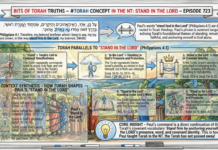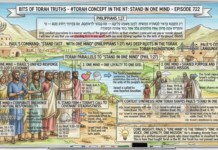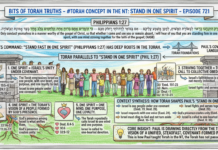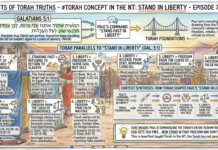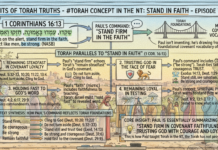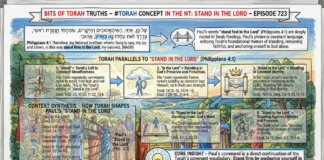Bits of Torah Truths – #Torah Concept in the NT: Ways to Live Free from Anxiety and Undue Care – Episode 643
1 Corinthians 7:28–35
7:28 אַךְ אִם תִּקַּח לְךָ אִשָּׁה אֵינְךָ חוֹטֵא. וְהַבְּתוּלָה אִם תִּנָּשֵׂא אֵינֶנָּה חוֹטֵאת, אֶלָּא שֶׁיִּהְיוּ לָהֶם צָרוֹת בִּבְשָׂרָם וַאֲנִי חָס עֲלֵיכֶם.7:29 וְזֹאת אֹמַר לָכֶם, אַחַי׃ הַזְּמַן דּוֹחֵק. עַל כֵּן יִהְיוּ אֵלֶּה שֶׁיֵּשׁ לָהֶם נָשִׁים כְּאִלּוּ אֵין לָהֶם;7:30 יִהְיוּ הַבּוֹכִים כְּאִלּוּ אֵינָם בּוֹכִים; הַשְּׂמֵחִים כְּאִלּוּ אֵינָם שְׂמֵחִים; הַקּוֹנִים כְּאִלּוּ אֵינָם בַּעֲלֵי קִנְיָן;7:31 וְהַנֶּהֱנִים מִן הָעוֹלָם הַזֶּה כְּאִלּוּ אֵינָם נֶהֱנִים מִמֶּנּוּ, כִּי חָלוֹף תַּחֲלֹף צוּרַת הָעוֹלָם הַזֶּה.7:32 רְצוֹנִי לִמְנֹעַ דְּאָגָה מִכֶּם. מִי שֶׁאֵינוֹ נָשׂוּי דּוֹאֵג לַדְּבָרִים אֲשֶׁר לָאָדוֹן, אֵיךְ יִיטַב בְּעֵינֵי הָאָדוֹן.7:33 אֲבָל מִי שֶׁנָּשׂוּי דּוֹאֵג לַדְּבָרִים הָאַרְצִיִּים, אֵיךְ יִיטַב בְּעֵינֵי הָאִשָּׁה,7:34 וּתְשׂוּמַת לִבּוֹ מְפֻלֶּגֶת. וְהָאִשָּׁה שֶׁאֵינָהּ נְשׂוּאָה, אוֹ הַבְּתוּלָה, דּוֹאֶגֶת לַדְּבָרִים אֲשֶׁר לָאָדוֹן כְּדֵי שֶׁתִּהְיֶה קְדוֹשָׁה הֵן בַּגּוּף וְהֵן בָּרוּחַ. אֲבָל הַנְּשׂוּאָה דּוֹאֶגֶת לַדְּבָרִים הָאַרְצִיִּים, כֵּיצַד תִּיטַב בְּעֵינֵי בַּעְלָהּ.7:35 זֹאת אֲנִי אוֹמֵר לְטוֹבַתְכֶם, לֹא כְּדֵי לְהַכְבִּיד עֲלֵיכֶם, אֶלָּא כְּדֵי שֶׁתִּתְנַהֲגוּ כַּיָּאוּת וְתִתְמַסְּרוּ לָאָדוֹן בְּאֵין מַפְרִיעַ.
#torah #torahwisdom #torahtruth #torahforlife #torah4you #torahtruth
1 Corinthians 7:28–35
7:28 But if you marry, you have not sinned; and if a virgin marries, she has not sinned. Yet such will have trouble in this life, and I am trying to spare you. 7:29 But this I say, brethren, the time has been shortened, so that from now on those who have wives should be as though they had none; 7:30 and those who weep, as though they did not weep; and those who rejoice, as though they did not rejoice; and those who buy, as though they did not possess; 7:31 and those who use the world, as though they did not make full use of it; for the form of this world is passing away. 7:32 But I want you to be free from concern. One who is unmarried is concerned about the things of the Lord, how he may please the Lord; 7:33 but one who is married is concerned about the things of the world, how he may please his wife, 7:34 and his interests are divided. The woman who is unmarried, and the virgin, is concerned about the things of the Lord, that she may be holy both in body and spirit; but one who is married is concerned about the things of the world, how she may please her husband. 7:35 This I say for your own benefit; not to put a restraint upon you, but to promote what is appropriate and to secure undistracted devotion to the Lord. (NASB)
https://www.matsati.com/index.php/category/bits-of-torah-truths/
Paul in 1 Corinthians 7:28–35 urges believers to live with undivided devotion to the Lord, free from “carefulness” (anxious distraction). The Torah does not use the same Greek categories, but it repeatedly lays down principles that parallel this ethic: trusting God’s provision, releasing anxiety about daily needs, and ordering life around covenantal devotion rather than constant worry. – Torah Parallels to Living Free from Anxiety and Undue Care – Daily Provision – Manna in the Wilderness – Exodus 16:4, 19–20 Israel is commanded to gather manna daily, not hoard it. Paul’s call to live without divided cares, focus on God’s portion for today. – Sabbath Rest as Release from Anxiety – Exodus 20:8–11; Deuteronomy 5:12–15 The Sabbath commandment requires ceasing from labor. Paul’s vision of undistracted devotion is to rest in God’s sufficiency. – Release from Debt and Burdens – Deuteronomy 15:1–2 The Sabbatical year cancels debts. Note how Paul’s concern is that believers not be “entangled” with undue worldly cares. – God’s Presence Removes Fear – Deuteronomy 31:6, 8 “Be strong and courageous, do not fear or be in dread… for the LORD goes with you.” Paul’s encouragement that singleness or marriage should not be driven by fear, but by devotion to the Lord. – Do Not Worry About Food or Clothing – Deuteronomy 8:3–4 Israel’s clothing did not wear out, and God fed them with manna. Paul is reminding us that worldly cares (pleasing spouse, managing household) can divide attention, but God’s provision is steady. The Torah Principle is that Anxiety is relieved by trusting God’s provision, resting in His appointed times (Sabbath, Sabbatical year), and focusing on covenantal faithfulness rather than self-driven striving. Paul’s Application (1 Cor. 7:28–35) is to Live with undivided devotion, free from anxious entanglements, whether married or single. Both the Torah and Paul converge on this ethic: freedom from anxiety comes through trust in God’s provision and ordering life around Him. This is how Paul taught Torah, the Torah has not passed away!

